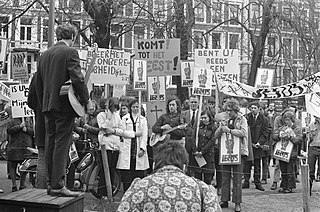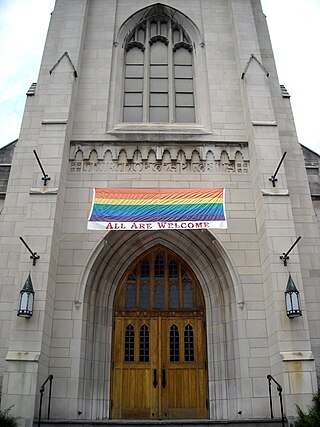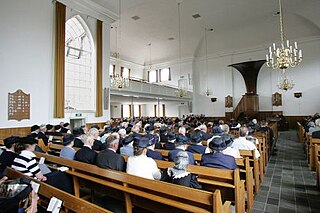Related Research Articles
Within Christianity, there are a variety of views on sexual orientation and homosexuality. The view that various Bible passages speak of homosexuality as immoral or sinful emerged through its interpretation and has since become entrenched in many Christian denominations through church doctrine and the wording of various translations of the Bible.
Evangelicalism, also called evangelical Christianity or evangelical Protestantism, is a worldwide interdenominational movement within Protestant Christianity that puts primary emphasis on evangelization. The word evangelic comes from the Greek word for 'good news'. The Gospel story of the salvation from sin is considered "the good news". The process of personal conversion involves complete surrender to Jesus Christ. The conversion process is authoritatively guided by the Bible, the God in Christianity's revelation to humanity. Critics of the conceptualization of evangelicalism argue that it is too broad, too diverse, or too ill-defined to be adequately seen as a movement or a single movement.
Christian fundamentalism, also known as fundamental Christianity or fundamentalist Christianity, is a religious movement emphasizing biblical literalism. In its modern form, it began in the late 19th and early 20th centuries among British and American Protestants as a reaction to theological liberalism and cultural modernism. Fundamentalists argued that 19th-century modernist theologians had misunderstood or rejected certain doctrines, especially biblical inerrancy, which they considered the fundamentals of the Christian faith.

The Jesus movement was an evangelical Christian movement that began on the West Coast of the United States in the late 1960s and early 1970s and primarily spread throughout North America, Europe, Central America, Australia and New Zealand, before it subsided in the late 1980s. Members of the movement were called Jesus people or Jesus freaks.
The Christian left is a range of Christian political and social movements that largely embrace social justice principles and uphold a social doctrine or social gospel based on their interpretation of the teachings of Christianity. Given the inherent diversity in international political thought, the term Christian left can have different meanings and applications in different countries. While there is much overlap, the Christian left is distinct from liberal Christianity, meaning not all Christian leftists are liberal Christians and vice versa.

Anthony Campolo Jr. was an American sociologist, Baptist pastor, author, public speaker, and spiritual advisor to U.S. President Bill Clinton. Campolo was an influential leader in the evangelical left. Campolo was a popular commentator on religious, political, and social issues, and had been a guest on programs such as The Colbert Report, The Charlie Rose Show, Larry King Live, Nightline, Crossfire, Politically Incorrect and The Hour.

Progressive Christianity represents a postmodern theological approach, which developed out of the liberal Christianity of the modern era, itself rooted in the Enlightenment's thinking. Progressive Christianity is a postliberal theological movement within Christianity that, in the words of Reverend Roger Wolsey, "seeks to reform the faith via the insights of post-modernism and a reclaiming of the truth beyond the verifiable historicity and factuality of the passages in the Bible by affirming the truths within the stories that may not have actually happened."
Liberal Christianity, also known as liberal theology and historically as Christian Modernism, is a movement that interprets Christian teaching by prioritizing modern knowledge, science and ethics. It emphasizes the importance of reason and experience over doctrinal authority. Liberal Christians view their theology as an alternative to both atheistic rationalism and theologies based on traditional interpretations of external authority, such as the Bible or sacred tradition.
The Evangelical left is a Christian left movement in Evangelical Christianity that affirms conservative evangelical theology and are politically progressive. It is mainly based in the US, but is also found in Latin America.

Reformed fundamentalism arose in some conservative Presbyterian, Congregationalist, Reformed Anglican, Reformed Baptist, Non-denominational and other Reformed churches, which agree with the motives and aims of broader evangelical Protestant fundamentalism. The movement was historically defined by a repudiation of liberal and modernist theology, the publication (1905–1915) entitled, The Fundamentals, and had the intent to progress and revitalise evangelical Protestantism in predominantly English-speaking Protestant countries, as well as to reform separated churches according to the Bible, historic expression of faith and the principles of the Reformation. The Fundamentalist–Modernist controversy, and the Downgrade controversy, kindled the growth and development of reformed fundamentalism in the United States and the United Kingdom. Reformed fundamentalists have laid greater emphasis on historic confessions of faith, such as the Westminster Confession of Faith.

Brian D. McLaren is an author, speaker, activist, public theologian and was a leading figure in the emerging church movement. McLaren is often associated with postmodern Christianity.
Conservative Christianity, also known as conservative theology, theological conservatism, traditional Christianity, or biblical orthodoxy is a grouping of overlapping and denominationally diverse theological movements within Christianity that seeks to retain the orthodox and long-standing traditions and beliefs of Christianity. It is contrasted with Liberal Christianity and Progressive Christianity, which are seen as heretical heterodoxies by theological conservatives. Conservative Christianity should not be mistaken as being necessarily synonymous with the political philosophy of conservatism, nor the Christian right.
Christian feminism is a school of Christian theology which uses the viewpoint of a Christian to promote and understand morally, socially, and spiritually the equality of men and women. Christian theologians argue that contributions by women and acknowledging women's value are necessary for a complete understanding of Christianity. Christian feminists are driven by the belief that God does not discriminate on the basis of biologically determined characteristics such as sex and race, but created all humans to exist in harmony and equality regardless of those factors. On the other hand, Christian egalitarianism is used for those advocating gender equality and equity among Christians but do not wish to associate themselves with the feminist movement.

Shane Claiborne is an American evangelical Christian and founder, an author and organizational leader. He is one of the founders of the non-profit organization, The Simple Way, in Philadelphia, Pennsylvania, cofounder of the Red-Letter Christians, and has been described as a founder, as well, of the New Monastic movement. Moreover, Claiborne is referred to in the press as an activist, given his advocacy for nonviolence and service to the poor. Among other writings, he is the author of the book, The Irresistible Revolution: Living as an Ordinary Radical (2006).
Christian views on environmentalism vary greatly amongst different Christians and Christian denominations.

Brandan Robertson is a gay writer, activist, Pastor, and TikTok religious influencer. He has written on the subjects of millennials, social justice, and Progressive Christianity, and he is an LGBTQ activist. Robertson serves as the Pastor of Sunnyside Reformed Church in Queens, New York.
Evangelical theology is the teaching and doctrine that relates to spiritual matters in evangelical Christianity and a Christian theology. The main points concern the place of the Bible, the Trinity, worship, salvation, sanctification, charity, evangelism and the end of time.
Moderate Christianity is a theological movement in Christianity that seeks to make decisions based on spiritual wisdom.
References
- ↑ Nick Tabor, Can this preacher's progressive version of evangelical Christianity catch on with a new generation?, washingtonpost.com, USA, January 6, 2020
- ↑ Michael Gryboski, Tony Campolo Defends Red Letter Christians, Says Jesus's Words 'Raise the Moral Standard', christianpost.com, USA, October 17, 2016
- ↑ Sam Hodges, "Red-letter Christians" have role in faith-filled campaign, dallasnews.com, USA, June 27, 2007
- ↑ Brantley W. Gasaway, Progressive Evangelicals and the Pursuit of Social Justice, University of North Carolina Press, USA, 2014, p. 19
- ↑ Rosie Dawson, Red Letter Christians gear up for UK launch, religionnews.com, USA, January 4, 2019
- ↑ Christian Today, Red Letter Christians UK launches with united stand against knife crime, christiantoday.com, UK, 17 June 2019
- ↑ Nick Tabor, Can this preacher's progressive version of evangelical Christianity catch on with a new generation?, washingtonpost.com, USA, January 6, 2020